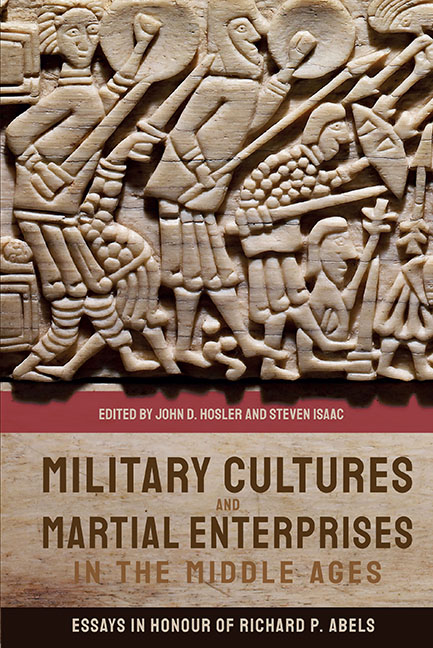Book contents
- Frontmatter
- Contents
- List of Illustrations
- Notes on Contributors
- Introduction and Appreciation
- 1 Charlemagne’s Invasion of Spain in 778: The Anatomy of a Strategic Failure and its Impact
- 2 Military Intelligence and Strategic Planning Under the Ottonian Kings of Germany, 919–1024
- 3 Ain’t Nobody Here But Us Chickens: Defeated Warriors, Masculinity, and Mistaken Identity in Western Europe, 679–1141
- 4 Count Baldwin V of Flanders: Broker of Eleventh-Century Power
- 5 Kings and Fortuna: The Meanings of Brémule
- 6 Fighting the Last War: Remembering the Norman Conquest during the Anarchy
- 7 Gilbert of Mons’ Chronicle of Hainaut as a Source for Military History in the Twelfth Century
- 8 At Home with Roger of Howden
- 9 Embedded Reporters? Ambroise, Richard de Templo, and Roger of Howden on the Third Crusade
- 10 The Treatment of Male and Female Prisoners of War during the Third Crusade
- 11 Exempla, Crusade, and Chivalry
- 12 Frontier Warfare in the St Omer Chronicle
- 13 Some Observations on the Training of Medieval Warhorses
- Richard P. Abels’ Curriculum Vitae
- Index
- Tabula Gratulatoria
6 - Fighting the Last War: Remembering the Norman Conquest during the Anarchy
Published online by Cambridge University Press: 21 October 2020
- Frontmatter
- Contents
- List of Illustrations
- Notes on Contributors
- Introduction and Appreciation
- 1 Charlemagne’s Invasion of Spain in 778: The Anatomy of a Strategic Failure and its Impact
- 2 Military Intelligence and Strategic Planning Under the Ottonian Kings of Germany, 919–1024
- 3 Ain’t Nobody Here But Us Chickens: Defeated Warriors, Masculinity, and Mistaken Identity in Western Europe, 679–1141
- 4 Count Baldwin V of Flanders: Broker of Eleventh-Century Power
- 5 Kings and Fortuna: The Meanings of Brémule
- 6 Fighting the Last War: Remembering the Norman Conquest during the Anarchy
- 7 Gilbert of Mons’ Chronicle of Hainaut as a Source for Military History in the Twelfth Century
- 8 At Home with Roger of Howden
- 9 Embedded Reporters? Ambroise, Richard de Templo, and Roger of Howden on the Third Crusade
- 10 The Treatment of Male and Female Prisoners of War during the Third Crusade
- 11 Exempla, Crusade, and Chivalry
- 12 Frontier Warfare in the St Omer Chronicle
- 13 Some Observations on the Training of Medieval Warhorses
- Richard P. Abels’ Curriculum Vitae
- Index
- Tabula Gratulatoria
Summary
SOMETIMES IT TAKES a second war to make people reflect on a first one. A well-known modern example is Paul Fussell's classic work The Great War and Modern Memory, in which the author uses his own experiences of combat during the Second World War as a point of comparison and contrast with the First World War. Had he not been forced personally to confront the need to make sense of his own war, he may never have undertaken his monumental study of the ways in which soldiers of the prior war reflected on and remembered theirs.
Of course, Fussell was a professional scholar. The motives of medieval historical writers were quite different, but they, too, were influenced by their own experiences. This chapter will argue that some of the English monastic chroniclers of the mid- to late twelfth century saw the Conquest of 1066 through the lens of the civil war of Stephen's reign. A number of prominent monastic houses, including Ely, Ramsey, Peterborough, Abingdon, and Battle, produced similar house-histories in the aftermath of the disturbances of the 1140s, all of which dwelt extensively on the events of the Conquest period. Three of these monasteries (Ely, Ramsey, and Peterborough) were close neighbors, while the fourth, Abingdon, was bound to Ely and Peterborough by ties of affiliation, having all been founded or refounded by St Athelwold, bishop of Winchester, in the mid-tenth century, while Ramsey was founded by St Athelwold's episcopal colleague, St Oswald of Worcester, on a site about midway between its two Fenland neighbors. The fifth monastery, Battle, is clearly the odd house out, since it was founded by William the Conqueror in the aftermath of his victory at the Battle of Hastings, and this heritage was reflected in and helped to shape the way in which the Battle chronicler portrayed the Conquest.
While the disorder of the so-called “Anarchy” of Stephen's reign is well known to have varied considerably across the country, the monasteries of the Fenlands in particular suffered disproportionately, and their experiences helped turn their attention to other points of disruption in the history of their houses, including the Norman Conquest.
- Type
- Chapter
- Information
- Military Cultures and Martial Enterprises in the Middle AgesEssays in Honour of Richard P. Abels, pp. 117 - 135Publisher: Boydell & BrewerPrint publication year: 2020
- 2
- Cited by

